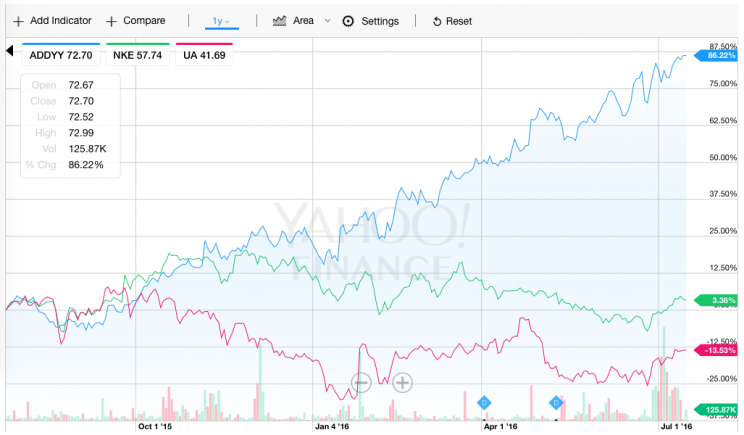Adidas calls Under Armour’s athletes ‘milquetoast’
After five bad years in the US, Adidas (ADDYY) is on the upswing. And the German sportswear giant’s top US executive thinks it’s largely thanks to smart athlete endorsement signings.
Adidas Group’s share of the US athletic footwear market fell every year from 2010 through 2014, and its US revenue fell in 2013 and again in 2014, to its lowest point (in USD) since 2009. The situation for Adidas in America looked grim until this year, when results suddenly got much sunnier.
In its full-year 2015 earnings in March, the company reported that net income at Adidas Group (which includes Adidas, Reebok, and golf club maker TaylorMade) grew 29% over 2014. Global sales for Adidas brand and Reebok brand grew 16% and 5.4%, respectively. Best of all for the health of the name, US sales for Adidas brand grew 12%.
In the first quarter of this year, the good news continued: US sales for Adidas Group rose 22% in North America, erasing a drop of about the same size in 2014. It also outpaced first-quarter growth at Nike and Under Armour. US sales for the Adidas brand were up 31%.
Adidas stock has responded to the good news, up 84% in the last year. In that time, Nike is up just 2.4% and Under Armour is down 6%.

It is Under Armour that has been the biggest obstacle in Adidas’s way in the US. The company Kevin Plank launched at the University of Maryland in 1996 had the overt mission of taking on Nike, and along the way it leapfrogged Adidas, in 2014, as the No. 2 apparel player.
But now Adidas is clawing back, and Mark King, CEO of Adidas USA, is taking shots at its Baltimore-based competitor. King, a colorful leader known for veering from the usual corporate script, was brought in two years ago to turn around Adidas in the US. Previously, he had been CEO of TaylorMade, the golf-club company Adidas acquired in 1997. (Interestingly, Adidas is now looking to sell off TaylorMade, which has been the lone dark cloud in its recent run of good US results; see the above Yahoo Finance video for more.)
In a phone interview with Yahoo Finance last month, King credited the US turnaround to a number of factors, including newly energized employees at the company’s US headquarters in Portland; exciting new product lines like the NMDs, the Superstar relaunch, and the Kanye West-designed Yeezy line (just this month Adidas went all in on West, signing him to a larger, more expansive contract); and new athlete signings.
It is the athlete signings that King has the most to say about. “When you look at football, baseball, basketball, we’re signing new athletes, and not just any athletes but the really great ones,” he says. King lists Houston Astros shortstop and 2015 AL Rookie of the Year Carlos Correa, Chicago Cubs slugger and 2015 MLB Rookie of the Year Kris Bryant, Green Bay Packers quarterback Aaron Rodgers, and Houston Rockets star James Harden, all of whom have signed with Adidas very recently, as examples. They match the new Adidas brand positioning in the US of “creators,” King says.
Athlete creators, King explains, “have individual personalities that try to carve out their own space. I think James Harden is the best example of that. A very unique athlete and personality, and we want to capitalize on his individuality.”
Asked about Under Armour’s athlete roster, King says, “I think most of the athletes at Under Armour are kind of milquetoast.” The word is somewhat archaic and typically means bland, timid, weak-willed, or unremarkable.
“Spieth, Brady, hey, they are great athletes, but when you talk about Carlos Correa and James Harden and some of these guys that have personality and really stand for being an individual, that’s unique positioning for us,” King says. “So yeah, there are competitors and they all have their own way; our way is finding athletes that see themselves as creators.”
King did not mention Stephen Curry, who has rocketed Under Armour to success in basketball footwear, and whose name was uttered 14 times in praise by Plank on Under Armour’s first-quarter earnings call. Under Armour also sponsors Olympic swimmer Michael Phelps, quarterback Cam Newton, and ballet dancer Misty Copeland.
It is indeed an interesting time for Adidas-sponsored athletes, and an interesting time in the endorsement wars overall. While Nike signed LeBron James to a “lifetime” endorsement extension last year not seen since Michael Jordan, and has made Rory McIlroy the new face of Nike Golf in the absence of Tiger Woods, Under Armour has rallied around Curry and Spieth.
Adidas, meanwhile, has deemphasized marketing of its highest-paid basketball star Derrick Rose in favor of James Harden, and on the golf course, TaylorMade-Adidas golfers Jason Day, Dustin Johnson, and Sergio Garcia have all seen great success this year, which is somewhat ironic considering Adidas wants to get rid of TaylorMade.
“I don’t think you can point to any one thing” for the turnaround, King says. That may be, but signing high-profile athletes is one of the things that has most energized the company and its shareholders. Adidas reports Q2 earnings on August 4.
—
Daniel Roberts is a writer at Yahoo Finance, covering sports business and technology. Follow him on Twitter at @readDanwrite.
Read more:
Adidas enters uncharted territory, going all in on Kanye West